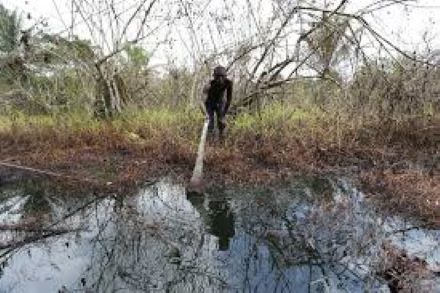Nigeria experienced at least 589 oil spills in 2024, according to data from the Oil Spill Monitor, a satellite tracker operated by the National Oil Spill Detection and Response Agency (NOSDRA). These spills, reported by oil exploration companies and host communities, highlight persistent challenges in curbing environmental pollution in the Niger Delta region.
The report noted a 49.3% decrease in recorded oil spills compared to 2023, which saw 1,162 incidents. Despite the reduction in the number of spills, the volume of crude oil spilled in 2024 remained comparable, with 19,000 barrels (approximately 3 million liters) discharged—equivalent to 95 oil tanker trucks. This was only slightly higher than the 18,747 barrels spilled in 2023.
Oil spills in 2024 were categorized based on severity:
- Major Spills: One incident involved over 250 barrels into inland waters or more than 2,500 barrels on land, swamps, or open seas, compared to three major spills in 2023.
- Medium Spills: Ten incidents fell into this category, involving 25–250 barrels spilled inland or 250–2,500 barrels on land.
- Minor Spills: There were 285 minor spills (up to 25 barrels inland or 250 barrels on land), down from 520 in 2023. Of these, 229 involved less than 10 barrels.
- Uncategorized Spills: 281 spills could not be categorized due to incomplete data, a marked improvement from 608 in 2023.
Additionally, 261 spills had no estimated quantity of oil provided, and 45 sites were not visited by Joint Investigation Teams.
The report identified several companies responsible for the highest number of spills:
- Nigerian Agip Oil Company (NAOC): 185 spills
- Shell Petroleum Development Company (SPDC): 169 spills
- NNPC E&P Limited (NEPL): 41 spills
- Heirs Energies Limited: 40 spills
- Mobil Producing Nigeria Unlimited (MPN): 27 spills
According to the report, two major causes of the oil spills were identified to be sabotage and oil theft, which accounted for 471 spills (approximately 80%) linked to pipeline sabotage and theft, and operational challenges, which accounted for 100 spills were attributed to equipment failure and operational issues.
The first half of 2024 saw an average of 53.6 sabotage-related spills per month, which decreased to 24.8 per month in the second half, attributed to intensified anti-theft operations.
The Nigerian National Petroleum Company Limited (NNPC) reported significant progress in combating oil theft. Over 3,000 illegal refineries were discovered and dismantled in 2024, alongside thousands of illegal pipelines.
“Through strategic collaboration with government security agencies, private security firms, and local communities, we have made significant progress in identifying and dismantling these illegal operations,” said NNPC Chief Corporate Communications Officer, Olufemi Soneye. “The results clearly show that oil thieves are being apprehended and prosecuted.”
Environmental and social impact
Oil spills continue to devastate the livelihoods of Niger Delta communities, polluting farmlands and fishing waters. International oil companies frequently attribute spills to sabotage, but host communities and NGOs argue for compensation for environmental damage.
The Hydrocarbon Pollution Remediation Project (HYPREP), established in 2012 under the Ministry of Environment, has made limited progress in cleaning up oil-polluted areas, particularly in Ogoniland.
Despite progress in reducing oil theft and categorizing spills, challenges remain. The enduring environmental and socio-economic impact of spills underscores the need for robust preventive measures, accountability, and accelerated remediation efforts. As Soneye remarked, “There is light at the end of the tunnel, but a sustained commitment is essential to protect lives, livelihoods, and the environment.”


